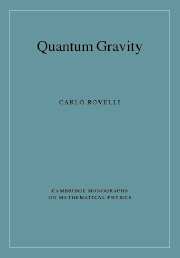Foreword
Published online by Cambridge University Press: 06 July 2010
Summary
The problem of what happens to classical general relativity at the extreme short-distance Planck scale of 10−33 cm is clearly one of the most pressing in all of physics. It seems abundantly clear that profound modifications of existing theoretical structures will be mandatory by the time one reaches that distance scale. There exist several serious responses to this challenge. These include effective field theory, string theory, loop quantum gravity, thermogravity, holography, and emergent gravity. Effective field theory is to gravitation as chiral perturbation theory is to quantum chromodynamics – appropriate at large distances, and impotent at short. Its primary contribution is the recognition that the Einstein–Hilbert action is no doubt only the first term in an infinite series constructed out of higher powers of the curvature tensor. String theory emphasizes the possible roles of supersymmetry, extra dimensions, and the standard-model internal symmetries in shaping the form of the microscopic theory. Loop gravity most directly attacks the fundamental quantum issues, and features the construction of candidate wave-functionals which are background independent. Thermogravity explores the apparent deep connection of semiclassical gravity to thermodynamic concepts such as temperature and entropy. The closely related holographic ideas connect theories defined in bulk spacetimes to complementary descriptions residing on the boundaries. Finally, emergent gravity suggests that the time-tested symbiotic relationship between condensed matter theory and elementary particle theory should be extended to the gravitational and cosmological contexts as well, with more lessons yet to be learned.
In each of the approaches, difficult problems stand in the way of attaining a fully satisfactory solution to the basic issues. Each has its band of enthusiasts, the largest by far being the string community.
- Type
- Chapter
- Information
- Quantum Gravity , pp. xiii - xivPublisher: Cambridge University PressPrint publication year: 2004



